Excavation Contractors Dunoon
Find top Excavating Contractors in Dunoon
Get multiple Excavation Contractors Near Me quotes for your project today! Compare profiles, reviews, accreditations, portfolio, etc... and choose the best offer.
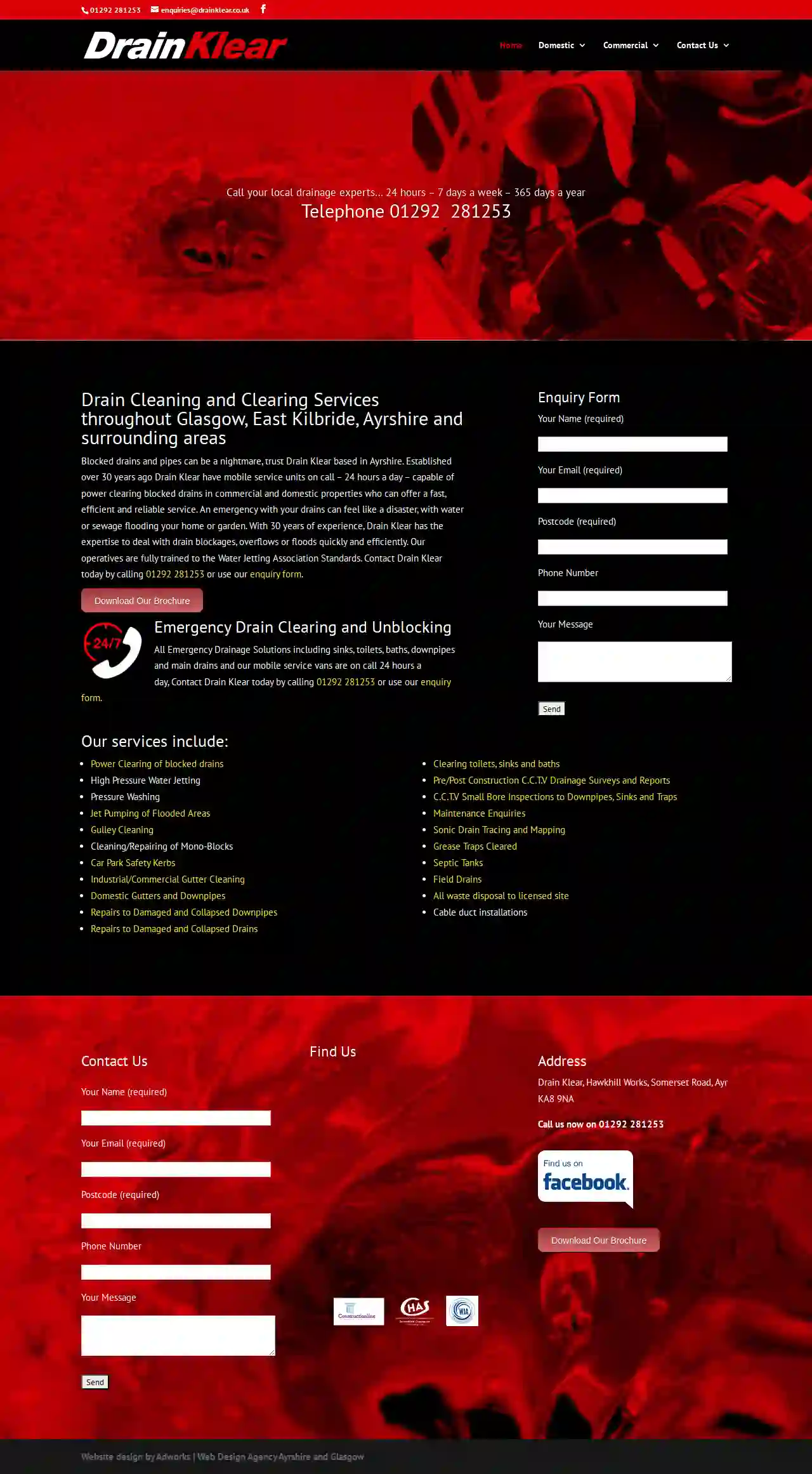
Drain Klear
530 reviewsHawkhill Works, Somerset Road, Ayr, KA8 9NA, GBDrain Klear: Your Trusted Drainage Experts Drain Klear is a leading drainage company based in Ayrshire, Scotland. We have been serving the needs of both domestic and commercial clients for over 30 years, providing a comprehensive range of drainage services. Our team of highly skilled and experienced operatives are available 24 hours a day, 7 days a week, 365 days a year to handle all your drainage needs, from emergency drain clearing to planned maintenance. We understand that a blocked drain can be a major inconvenience, and we are committed to providing a fast, efficient, and reliable service. Our mobile service units are equipped with the latest technology and equipment to tackle any drainage problem, no matter how big or small. At Drain Klear, we pride ourselves on our commitment to customer satisfaction. We are fully accredited and insured, and we always go the extra mile to ensure that our clients are happy with our work. We are also committed to providing a safe and environmentally friendly service. Whether you are experiencing a blocked drain, a flooded basement, or need a regular maintenance check, Drain Klear is the company to call. Contact us today for a free quote.
- Services
- Why Us?
- Gallery
Get Quote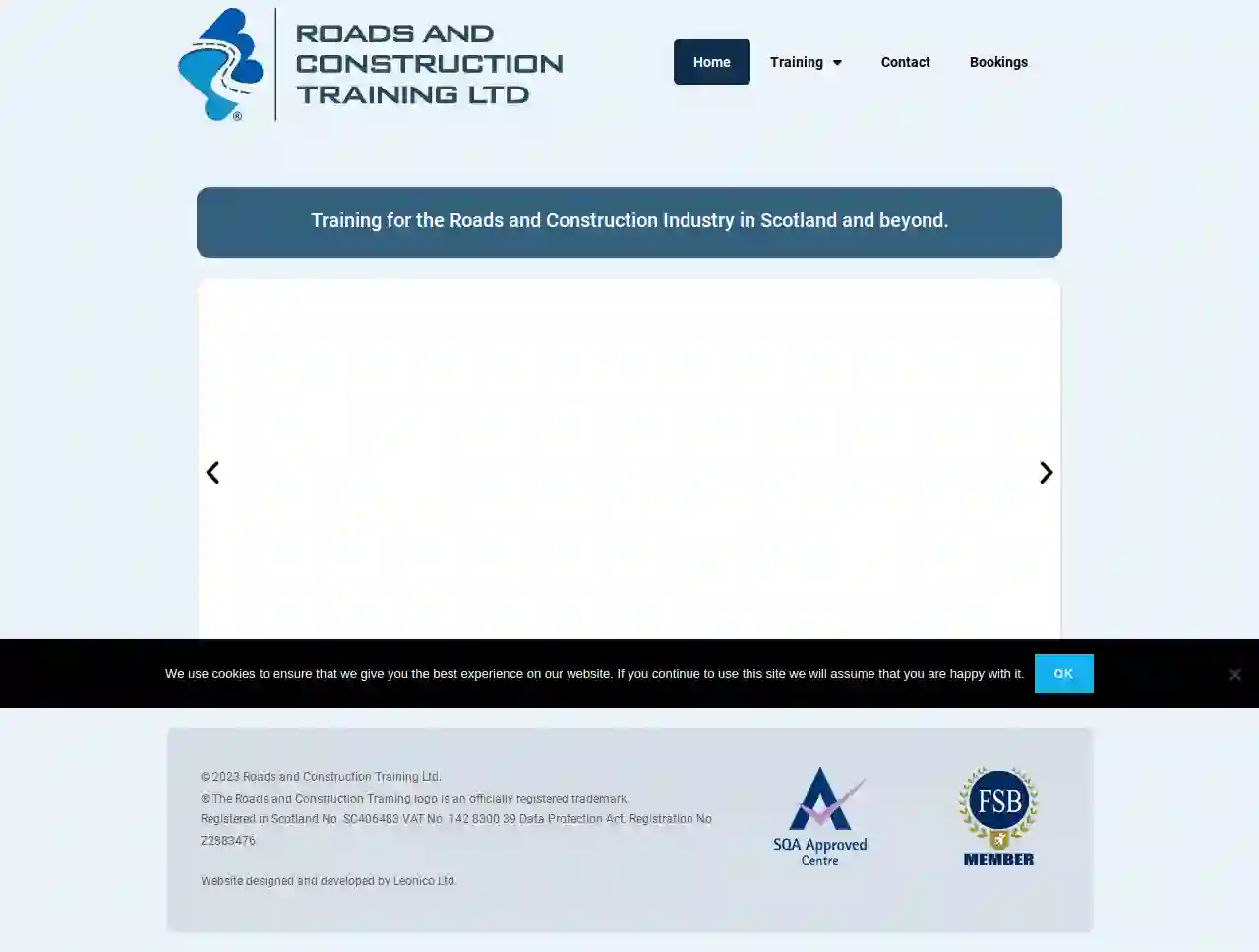
Roads and Construction Training Ltd
Glasgow, GBTraining for the Roads and Construction Industry in Scotland and beyond. Roads and Construction Training are a professionally run training organisation whose instructors are all experts within their own fields of operations, roadwork’s, construction and utilities sectors. Having been approved by the Awarding body SQA, we can provide an extensive range of highly recognised awards, all of which comply with The Government Legislative requirements of HSE and SQA, and The National Occupational Standards, also that of The National Specification Requirements for NRSWA and Codes of Practice associated within Roadwork’s Specifications for working on Roads, Highways.We are about “Taking the Training to the Client, not the Client to the Training”. On-Site Training and AssessmentEquipped to provide On-site training and assessment where required, our highly experienced and qualified staff are committed to providing a quality service where ever the need maybe. Nowadays within the Roads, Construction and Utilities Industries there has never been a greater demand for the Improvement of Standards and Quality of Workmanship to improve. Our highly recognised qualifications awarded and approved by SQA, are for all occupations within these Industries mentioned above, and are aimed at all levels from the most junior to the most senior these qualifications are for youth and adult learning, they are highly recognised for improving personnel skills, employability and career prospects and are about improving and putting the skills back into the industry. Our service shall meet the standards with a view to improving them and to ensure we are achieving the highest level of satisfaction for our clients.
- Services
- Why Us?
- Accreditations
- Gallery
Get Quote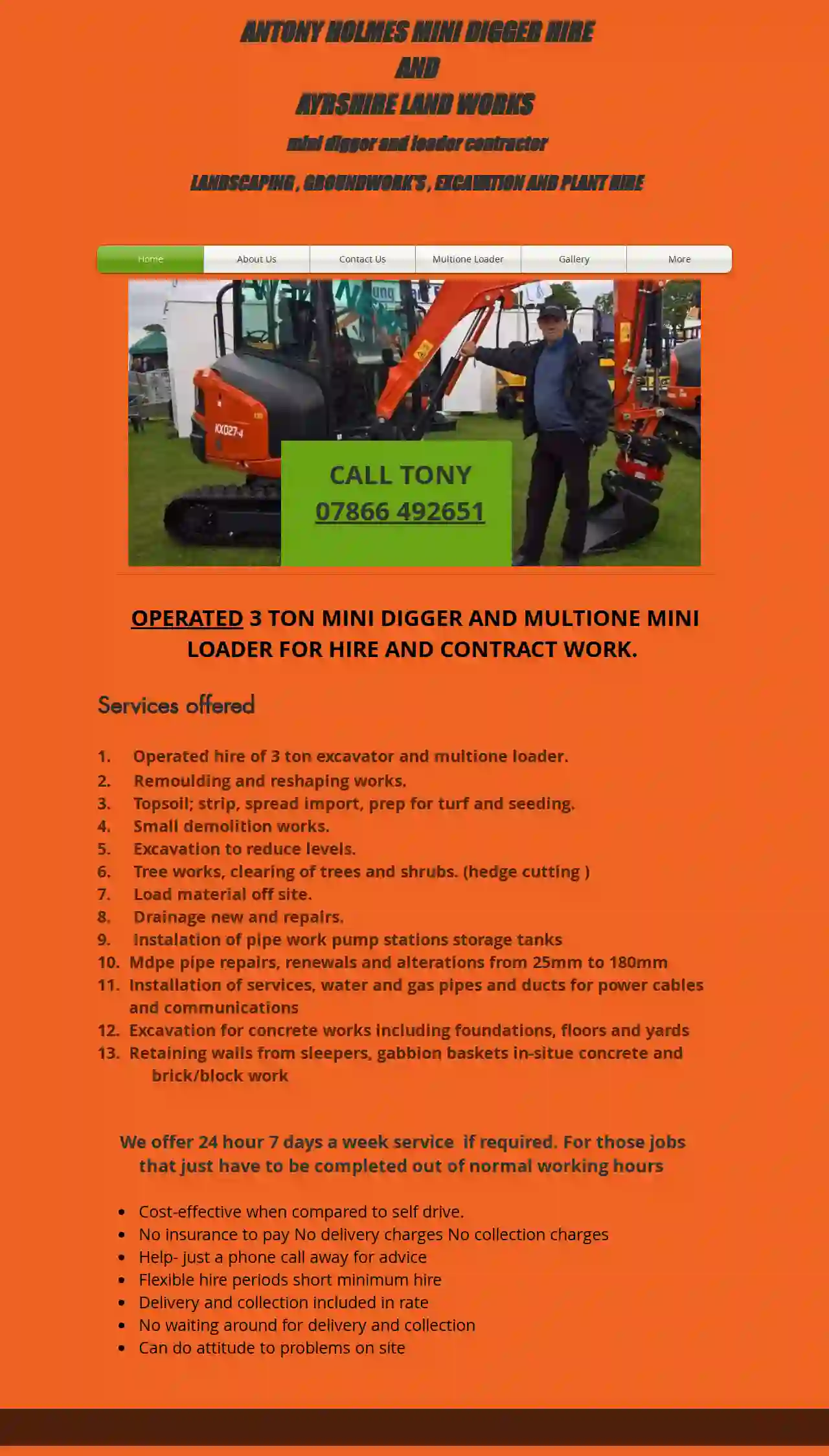
Antony Holmes Mini Digger Hire
59 reviewsAyr, GBAntony Holmes Mini Digger Hire and Ayrshire Land Works We are a mini digger and loader contractor specializing in landscaping, groundwork, excavation, and plant hire. We offer a wide range of services to meet your needs, including: - Operated hire of 3 ton excavator and multione loader - Remoulding and reshaping works - Topsoil: strip, spread import, prep for turf and seeding - Small demolition works - Excavation to reduce levels - Tree works, clearing of trees and shrubs (hedge cutting) - Load material off site - Drainage new and repairs - Installation of pipe work pump stations storage tanks - MDPE pipe repairs, renewals and alterations from 25mm to 180mm - Installation of services, water and gas pipes and ducts for power cables and communications - Excavation for concrete works including foundations, floors and yards - Retaining walls from sleepers, gabbion baskets in-situ concrete and brick/block work We offer a 24-hour, 7-days-a-week service if required. For those jobs that just have to be completed out of normal working hours, we are here to help. Our services are cost-effective when compared to self-drive, with no insurance, delivery, or collection charges. We offer flexible hire periods with short minimum hire, and delivery and collection are included in the rate. We are always happy to help with advice and have a can-do attitude to problems on site.
- Services
- Why Us?
- Gallery
Get Quote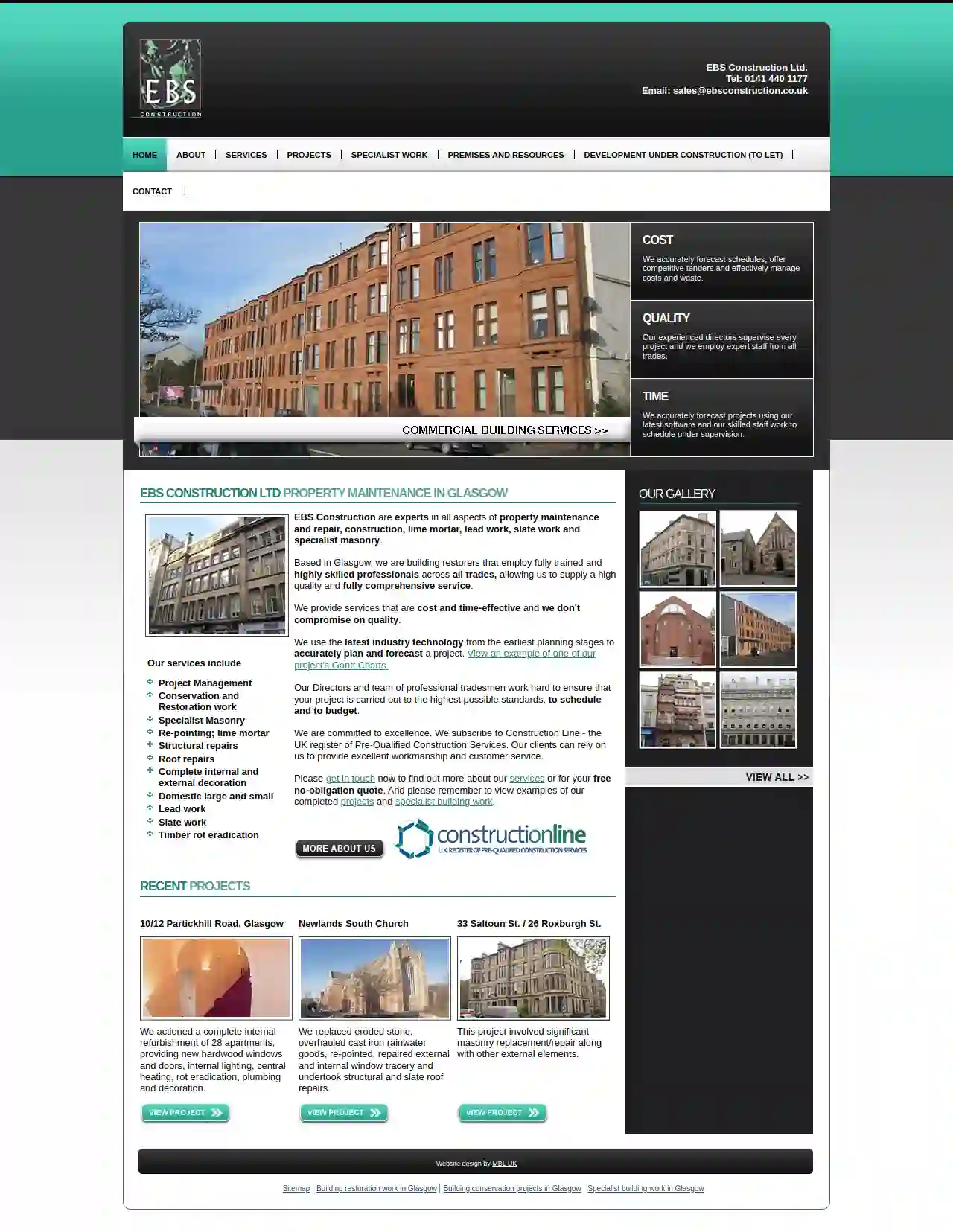
EBS Construction
3.89 reviews10 Loanbank Quadrant, Glasgow, G51 3HZ, GBEBS Construction: Your Trusted Partner for Property Maintenance and Restoration in Glasgow EBS Construction is a leading provider of property maintenance and restoration services in Glasgow. We are experts in all aspects of building restoration, including lime mortar, lead work, slate work, and specialist masonry. Our team of fully trained and highly skilled professionals across all trades ensures that we deliver a high-quality and fully comprehensive service. Our Commitment to Excellence At EBS Construction, we are committed to providing our clients with the highest quality workmanship and customer service. We subscribe to Construction Line, the UK register of Pre-Qualified Construction Services, giving our clients the assurance of our expertise and reliability. Our Services We offer a wide range of services, including: Project Management Conservation and Restoration work Specialist Masonry Re-pointing; lime mortar Structural repairs Roof repairs Complete internal and external decoration Domestic large and small Lead work Slate work Timber rot eradication Our Approach We are dedicated to delivering cost-effective and time-efficient solutions without compromising on quality. We utilize the latest industry technology from the initial planning stages to accurately plan and forecast projects. Our Directors and team of professional tradesmen work diligently to ensure that your project is completed to the highest standards, on schedule, and within budget. Why Choose EBS Construction? We are a trusted and experienced team with a proven track record of delivering exceptional results. We are committed to providing our clients with a seamless and stress-free experience. Contact us today for a free, no-obligation quote and let us help you bring your project to life.
- Services
- Why Us?
- Gallery
Get Quote
EK, East Kilbride
3.9300 Cornwall Street East Kilbride, East Kilbride, G74 1LL, GBEast Kilbride Shopping Centre: Your One-Stop Shop for Shopping, Dining, and Entertainment Discover the largest undercover shopping and leisure destination in Scotland, offering a diverse range of shops, restaurants, and entertainment options. From fashion and homeware to dining and leisure, EK has something for everyone. Explore our wide selection of stores, enjoy delicious meals at our restaurants, and catch the latest movies at our state-of-the-art cinema. With convenient parking and a welcoming atmosphere, EK is the perfect place to spend a day out with friends and family. Stay up-to-date with the latest news, events, and offers by subscribing to our newsletter. We're always adding new stores and experiences, so be sure to check back often.
- Services
- Why Us?
- Gallery
Get Quote
Star Asbestos Survey Coatbridge
51 reviews34 Main St, Coatbridge, ML5 3BU, GBWELCOME TO ASBESTOS SPECIALIST OF THE UK A Company You Can Rely On At Affordable Rates! We are a Licenced Health & Safety Nationwide with offices in Coatbridge, St. Helensshire, London, Scotland, Wales and the Midlands.Your one-stop destination for safe asbestos removal and disposal in UK. We provide a comprehensive range of asbestos removal services in UK for domestic, industrial and commercial properties.If you need a Survey or advice relating to your asbestos-related problems, we can provide you with packages that are customised to cater to your specific requirements. We apply the most effective and current techniques for removing asbestos quickly and safely.Detailed method statements are designed to make sure that best practices are implemented at all times and they are compliant with UKs rules and regulations. Read More
- Services
- Why Us?
- Testimonials
- Gallery
Get Quote
Concrete Repairs Ltd (CRL)
4.68 reviewsCathite House 23a Willow Lane Mitcham Surrey, Mitcham, CR4 4TU, GBWelcome to CRL CRL is one of the leading specialist concrete repair & asset maintenance contractors for buildings and structures operating across the UK through a network of 6 regional offices. We provide a comprehensive asset management and asset maintenance service for buildings and all concrete structures. With over 65 years' experience, CRL deliver proven and cost effective refurbishment options which meet our clients' objectives of upgrading and extending the life of their structures. CRL are flexible and work collaboratively with our clients. This has helped us secure a high percentage of repeat business across all sectors as either a Principal Contractor or specialist sub-contractor. Safety & Sustainability CRL have a reputation based on quality and innovative engineering underpinned by our commitment to health, safety and sustainability. CRL are committed to reducing our carbon footprint and that of our Clients' by conducting our business and the works we carry out in accordance with the guidelines set out in the ICE's Carbon Project initiative. As a company we operate knowing that nothing we do is so important that it cannot be done safely and sustainably. We strive to create a safe, healthy and sustainable environment in which no one, including our planet, is harmed.
- Services
- Why Us?
- Our Team
- Gallery
Get Quote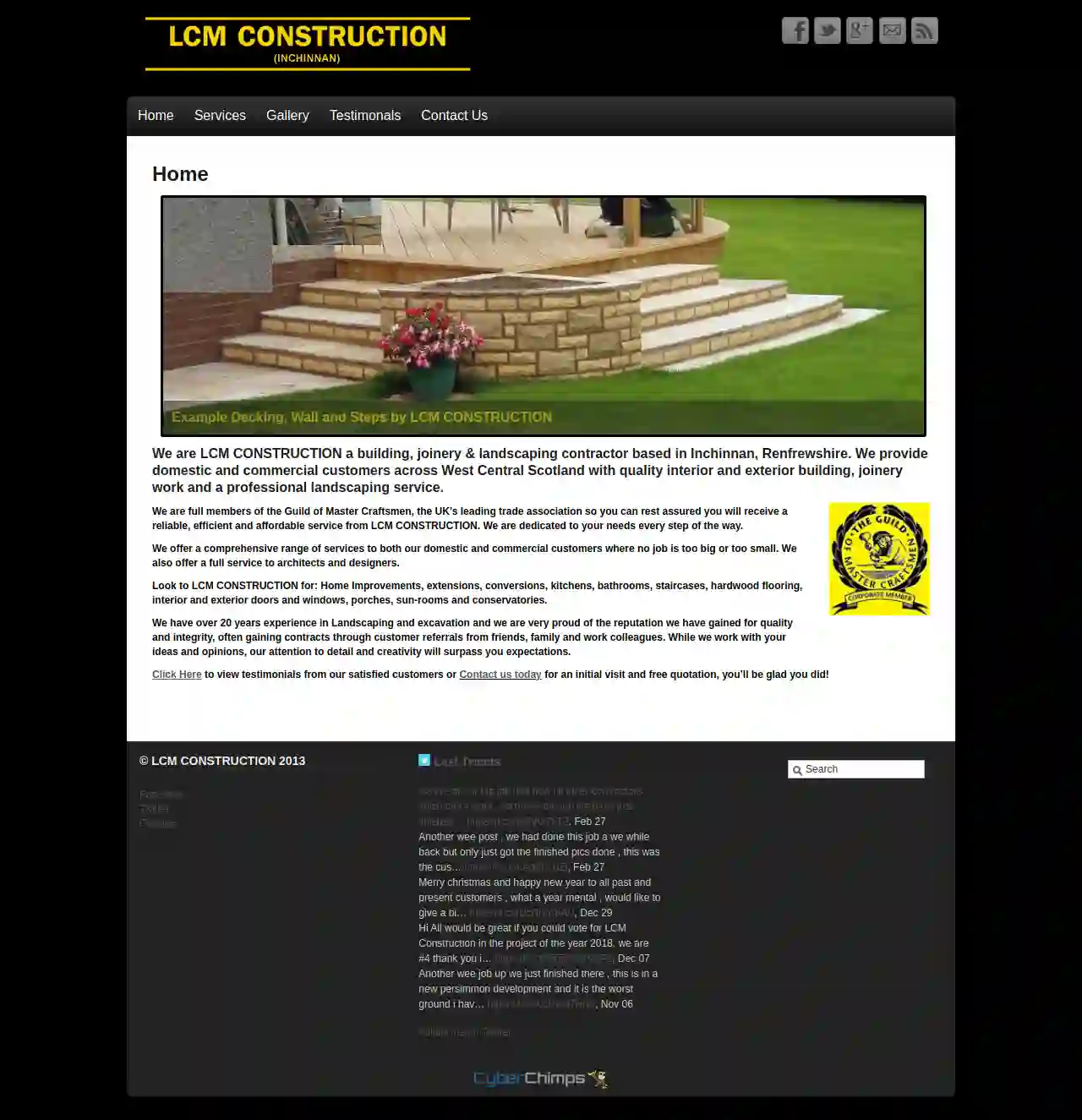
LCM Construction
51 reviewsUnit 1, Inchinnan Business Park, Renfrewshire, Inchinnan, PA4 9SF, GBLCM CONSTRUCTION: Your Trusted Building, Joinery & Landscaping Experts LCM CONSTRUCTION is a reputable building, joinery, and landscaping contractor based in Inchinnan, Renfrewshire. We cater to both domestic and commercial clients across West Central Scotland, delivering high-quality interior and exterior building, joinery work, and professional landscaping services. As full members of the Guild of Master Craftsmen, the UK's leading trade association, we guarantee reliable, efficient, and affordable services. Our commitment to your satisfaction is unwavering, guiding us every step of the way. We offer a comprehensive range of services, handling projects of all sizes. Whether you need home improvements, extensions, conversions, kitchens, bathrooms, staircases, hardwood flooring, interior and exterior doors and windows, porches, sun-rooms, or conservatories, we've got you covered. We also extend our expertise to architects and designers, providing a full service to meet their needs. With over 20 years of experience in landscaping and excavation, we've built a strong reputation for quality and integrity. Our dedication to excellence often leads to new contracts through referrals from satisfied customers, friends, family, and colleagues. We work closely with your ideas and opinions, but our attention to detail and creativity will exceed your expectations. Explore our testimonials to hear firsthand from our satisfied customers. Contact us today for an initial visit and a free quotation. You won't regret it!
- Services
- Why Us?
- Gallery
Get Quote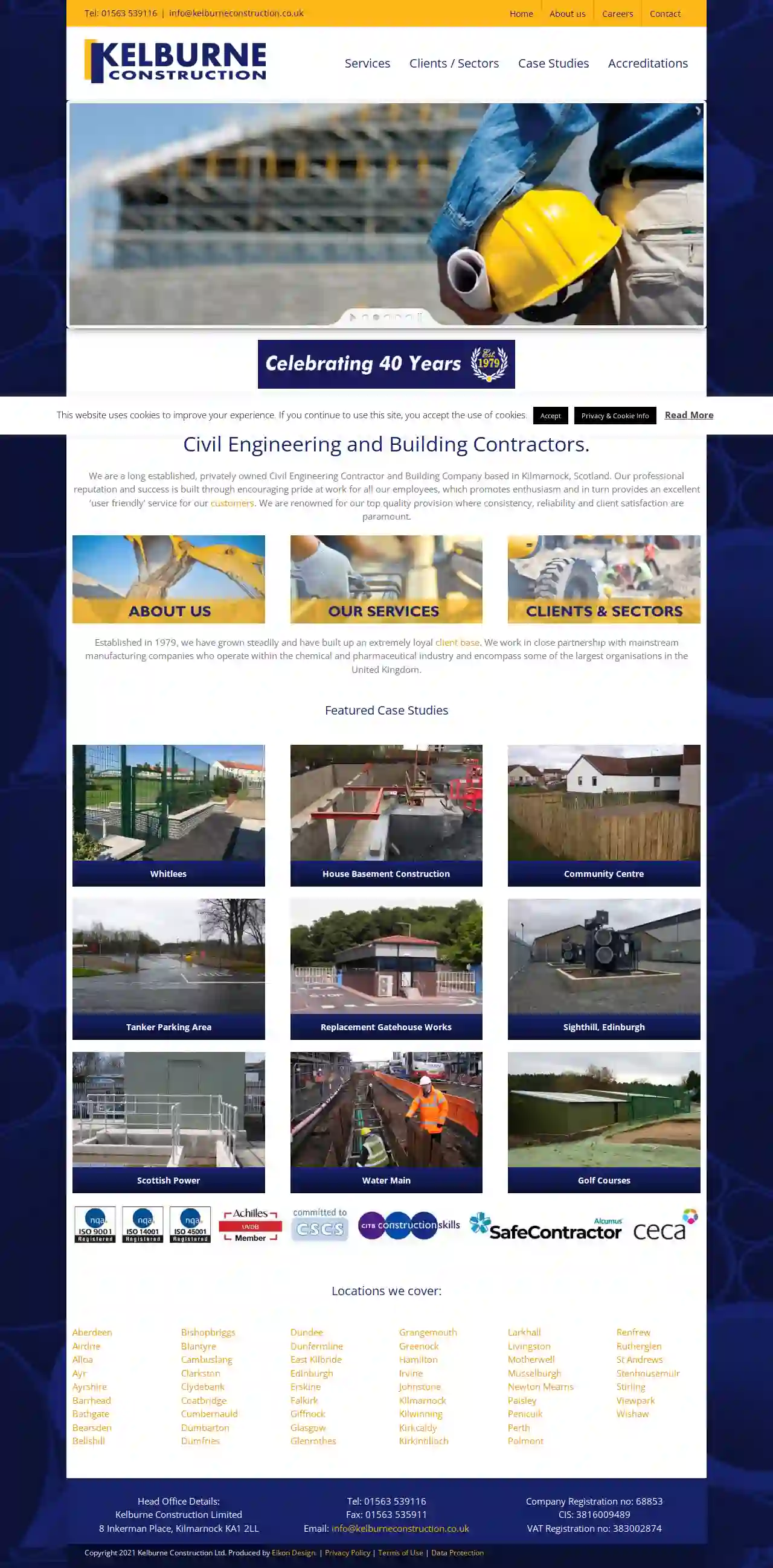
Kelburne Construction
3.88 reviews8 Inkerman Place, Kilmarnock, KA1 2LL, GBWelcome to Kelburne Construction, one of Scotland’s leading Civil Engineering and Building Contractors. We are a long established, privately owned Civil Engineering Contractor and Building Company based in Kilmarnock, Scotland. Our professional reputation and success is built through encouraging pride at work for all our employees, which promotes enthusiasm and in turn provides an excellent ‘user friendly’ service for our customers. We are renowned for our top quality provision where consistency, reliability and client satisfaction are paramount. Established in 1979, we have grown steadily and have built up an extremely loyal client base. We work in close partnership with mainstream manufacturing companies who operate within the chemical and pharmaceutical industry and encompass some of the largest organisations in the United Kingdom.
- Services
- Why Us?
- Gallery
Get Quote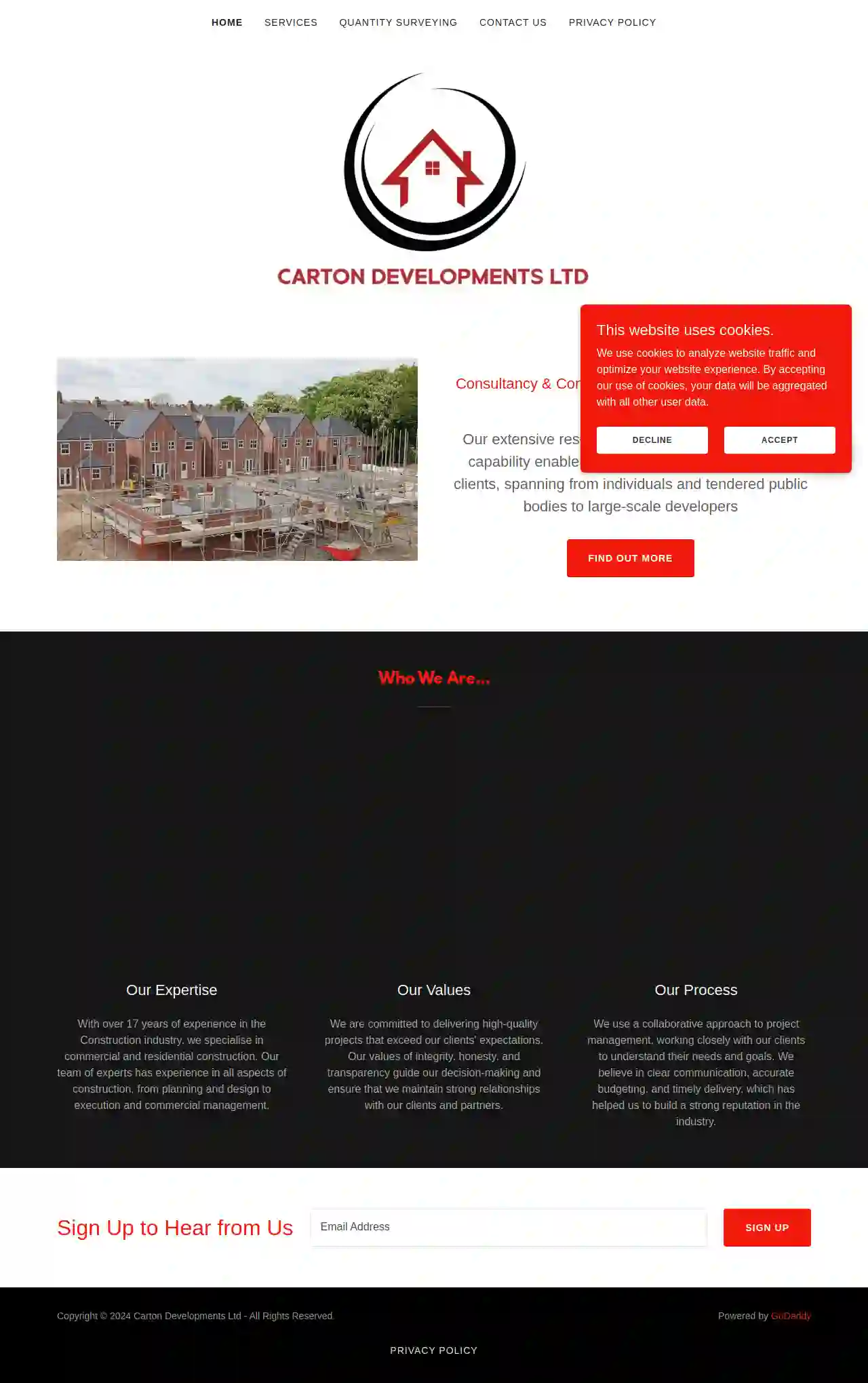
Carton Developments Ltd
Glasgow, GBConsultancy & Contracting based on Experience and Prudence Our extensive resources, wealth of experience, and capability enable us to cater to a diverse range of clients, spanning from individuals and tendered public bodies to large-scale developers. Find Out More Who We Are... With over 17 years of experience in the Construction industry, we specialise in commercial and residential construction. Our team of experts has experience in all aspects of construction, from planning and design to execution and commercial management. Our Values We are committed to delivering high-quality projects that exceed our clients' expectations. Our values of integrity, honesty, and transparency guide our decision-making and ensure that we maintain strong relationships with our clients and partners. Our Process We use a collaborative approach to project management, working closely with our clients to understand their needs and goals. We believe in clear communication, accurate budgeting, and timely delivery, which has helped us to build a strong reputation in the industry.
- Services
- Why Us?
- Gallery
Get Quote
Over 13,059+ Excavation Contractors on our directory
Our excavation pros operate in Dunoon and beyond!
ExcavationHQ has curated and vetted the Best Excavation Companies near Dunoon. Find a top & reliable pro today.
Frequently Asked Questions About Excavation Contractors
- Determining Soil Suitability: Assessing whether the soil can support the intended structure or load.
- Recommending Foundation Types: Advising on the appropriate foundation design based on soil characteristics.
- Addressing Drainage and Erosion Issues: Providing solutions to manage water runoff and prevent erosion.
- Evaluating Slope Stability: Assessing the risk of landslides or soil movement on slopes.
- Building on challenging soil types (expansive clay, loose sand, etc.)
- Constructing large or complex structures
- Excavating near slopes or retaining walls
- Addressing drainage or erosion concerns
- Trench Collapses: Unstable trench walls can cave in, posing a severe risk to workers. Proper shoring and sloping are crucial safety measures.
- Utility Damage: Striking underground utilities (gas, water, electric) can cause leaks, explosions, or electrocution. Accurate utility locates and careful digging are essential.
- Falling Objects: Materials or equipment falling into excavations can injure workers. Securing work areas and using appropriate safety gear is vital.
- Equipment Accidents: Operating heavy machinery involves risks of rollovers, collisions, or mechanical failures. Trained operators and proper equipment maintenance are critical.
- Environmental Hazards: Excavated soil might contain hazardous materials (asbestos, lead). Proper testing and disposal procedures are necessary.
- Excavators: Versatile machines with a bucket, arm, and rotating cab for digging, lifting, and moving earth.
- Backhoes: Similar to excavators but with a digging bucket on the back and a loader bucket on the front, ideal for trenching and smaller excavations.
- Bulldozers: Powerful machines with a large blade for pushing earth, clearing land, and leveling surfaces.
- Skid Steers: Compact and maneuverable loaders with various attachments (buckets, forks) for digging, loading, and grading in tight spaces.
- Trenchers: Specialized machines for digging narrow trenches for utilities.
- Dump Trucks: Vehicles for hauling excavated material to disposal sites.
- Basement Size: The larger the basement, the more excavation is required, increasing the cost.
- Soil Type: Excavating rocky or dense clay soil is generally more expensive than loose soil.
- Accessibility: Difficult-to-access sites might require specialized equipment or more labor, driving up costs.
- Foundation Type: The chosen foundation type (full basement, crawl space, slab) affects excavation needs.
- Underpinning: If underpinning (strengthening existing foundations) is necessary, it significantly increases costs.
- Disposal Fees: Hauling excavated soil to disposal sites adds to the overall expense.
What is a soil engineer, and do I need one?
What are the risks associated with excavation?
What equipment is used for excavation?
How much does it cost to excavate a basement?
What is a soil engineer, and do I need one?
- Determining Soil Suitability: Assessing whether the soil can support the intended structure or load.
- Recommending Foundation Types: Advising on the appropriate foundation design based on soil characteristics.
- Addressing Drainage and Erosion Issues: Providing solutions to manage water runoff and prevent erosion.
- Evaluating Slope Stability: Assessing the risk of landslides or soil movement on slopes.
- Building on challenging soil types (expansive clay, loose sand, etc.)
- Constructing large or complex structures
- Excavating near slopes or retaining walls
- Addressing drainage or erosion concerns
What are the risks associated with excavation?
- Trench Collapses: Unstable trench walls can cave in, posing a severe risk to workers. Proper shoring and sloping are crucial safety measures.
- Utility Damage: Striking underground utilities (gas, water, electric) can cause leaks, explosions, or electrocution. Accurate utility locates and careful digging are essential.
- Falling Objects: Materials or equipment falling into excavations can injure workers. Securing work areas and using appropriate safety gear is vital.
- Equipment Accidents: Operating heavy machinery involves risks of rollovers, collisions, or mechanical failures. Trained operators and proper equipment maintenance are critical.
- Environmental Hazards: Excavated soil might contain hazardous materials (asbestos, lead). Proper testing and disposal procedures are necessary.
What equipment is used for excavation?
- Excavators: Versatile machines with a bucket, arm, and rotating cab for digging, lifting, and moving earth.
- Backhoes: Similar to excavators but with a digging bucket on the back and a loader bucket on the front, ideal for trenching and smaller excavations.
- Bulldozers: Powerful machines with a large blade for pushing earth, clearing land, and leveling surfaces.
- Skid Steers: Compact and maneuverable loaders with various attachments (buckets, forks) for digging, loading, and grading in tight spaces.
- Trenchers: Specialized machines for digging narrow trenches for utilities.
- Dump Trucks: Vehicles for hauling excavated material to disposal sites.
How much does it cost to excavate a basement?
- Basement Size: The larger the basement, the more excavation is required, increasing the cost.
- Soil Type: Excavating rocky or dense clay soil is generally more expensive than loose soil.
- Accessibility: Difficult-to-access sites might require specialized equipment or more labor, driving up costs.
- Foundation Type: The chosen foundation type (full basement, crawl space, slab) affects excavation needs.
- Underpinning: If underpinning (strengthening existing foundations) is necessary, it significantly increases costs.
- Disposal Fees: Hauling excavated soil to disposal sites adds to the overall expense.